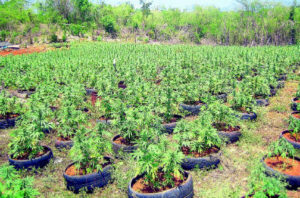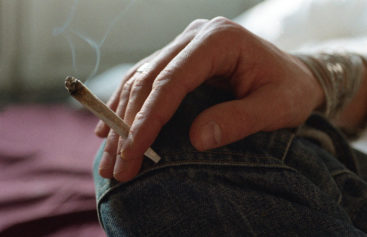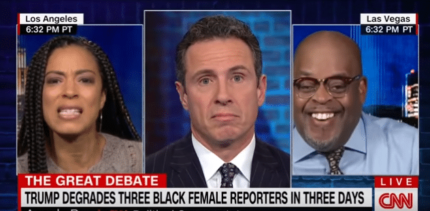
At times, Trump’s position has shifted, though, as of late, he’s claimed to be in favor of medical marijuana, stopping short of endorsing the full legalization of the drug or revealing whether he’ll interfere with state rights to do so. Meanwhile, newly installed Attorney General Jeff Sessions has been crystal clear about his own stance, infamously stating, “Good people don’t smoke marijuana”
Now, Massachusetts and Maine, the latest states to legalize the drug, are left in limbo. Whereas the Obama administration had remained largely hands-off, allowing states to make their own laws regarding marijuana legalization and reducing sentences for a number of small drug offenses, under Sessions, the Justice Department may be poised to reverse that trend.
Last month, White House press secretary Sean Spicer alluded to such, telling reporters, “I do believe that you’ll see greater enforcement. There’s a big difference between the medical use and recreational use, which is something the Department of Justice will be further looking into.”
Since declaring drug abuse as “enemy No. 1,” the United States has doggedly pursued the failed “War on Drug” crusade, often at the expense of its own citizens. Coined in June 1971, the Nixon administration struck hard, increasing federal drug agencies and implementing harsh tactics that included mandatory sentencing. By 2011, the Global Commission on Drug Policy would admit that “the global war on drugs has failed, with devastating consequences for individuals and societies around the world.”
They added, “Political leaders and public figures should have the courage to articulate publicly what many of them acknowledge privately — that the evidence overwhelmingly demonstrates that repressive strategies will not solve the drug problem and that the war on drugs has not, and cannot, be won.”
But, of course, we already knew that.
Even more disheartening, much of the drug war was by design, as revealed by John Ehrlichman, former Nixon domestic-policy chief and a key figure during the Watergate scandal. Ehrlichman admitted in a 1994 interview that, “The Nixon campaign in 1968, and the Nixon White House after that, had two enemies: the antiwar left and Black people.”
He added, “You understand what I’m saying? We knew we couldn’t make it illegal to be either against the war or Black, but, by getting the public to associate the hippies with marijuana and blacks with heroin and then criminalizing both heavily, we could disrupt those communities. We could arrest their leaders, raid their homes, break up their meetings and vilify them night after night on the evening news. Did we know we were lying about the drugs? Of course, we did.”
The damage was devastating to the Black community. By disproportionately targeting Blacks and other minorities, prison rates exploded, each administration playing its own role. This includes President Clinton who, despite being immensely popular, was directly responsible for increasing the prison population by over 673,000 during his presidency. Of that injustice, New Jersey Sen. Cory Booker told ABC’s “This Week” with George Stephanopoulos, “We now have more African-Americans under criminal supervision than all the slaves back in the 1850s.”
A study by the Justice Policy Institute revealed, “Under President Bill Clinton, the number of prisoners under federal jurisdiction doubled and grew more than it did under the previous 12 years of Republican rule.”
At just 12 percent of the U.S. population, African-American men are now 13 times more likely to be sent to prison for drug charges than their white counterparts. And, despite using illegal substances at roughly the same rate, studies show that African-Americans are still apt to receive longer sentences. Human Rights Watch says, “The disparities are particularly tragic in individual states where Black men are sent to federal prison on drug charges at 57 times greater than White men.”
As Ava DuVernay’s critically acclaimed “13th” illustrates, though the 13th amendment formally abolished slavery and indentured servitude, the U.S. has continued to profit from free labor, now supplied via mass incarceration. By enacting stiff penalties for minor drug offenses, the United State’s prison population has soared, boosted by millions of Black and brown bodies.
It’s a reality that entrepreneur Wanda James, widely credited as the first African-American to own a dispensary in Colorado, knows all too well. After being jailed for weed possession, her own brother was sentenced to 10 years in prison and forced to pick cotton in Texas.
It was then that James first likened the prison industry to a repackaged version of slavery, later explaining to Official Black Wall Street, “Well, the whole Black and Latino thing is mind-boggling and to understand what’s happening, you have to understand the prison system and the prison industrial complex. America was built on slave labor. It always has been.”
She added to High Times, “To have a Black man picking cotton seemed ridiculous. Where I went to school — the University of Colorado — my friends and I would sit out on the front stoop of the dorm and smoke weed. Cops would walk by and be like, “Hey, put that away.” We’d put it away, and I had never known that people were actually arrested for pot. I always thought it was a ticket.”
Using her brother’s story as inspiration, James opened a dispensary in Denver, joining just one percent of Black entrepreneurs in the cannabis industry. But with a shift in administration, she and others like her may now face roadblocks of their own, thanks in part to Sessions’ staunch anti-legalization ideology.
Making it clear that he will not bend, Sessions recently told reporters, “I don’t think America is going to be a better place when people of all ages, and particularly young people, are smoking pot. I believe it’s an unhealthy practice and current levels of THC in marijuana are very high compared to what they were a few years ago and we’re seeing real violence around that.”
He added, “States, they can pass the laws they choose. I would just say it does remain a violation of federal law to distribute marijuana throughout any place in the United States, whether a state legalizes it or not.”
With neighboring states, including Nebraska, currently waging their own war against Colorado’s marijuana boom and with Sessions at the helm, it may become even harder for African-American entrepreneurs like James to prosper in the industry.
In truth, America does have a drug problem, but it’s not weed. Rather, it’s the opioid and heroin epidemic currently ravishing the nation’s heartland, suburbs and elsewhere. Much like marijuana was used as a scapegoat during Nixon’s time, under the Trump administration, it may once again become a catalyst for funneling more Black and brown bodies into private prisons across the nation.


